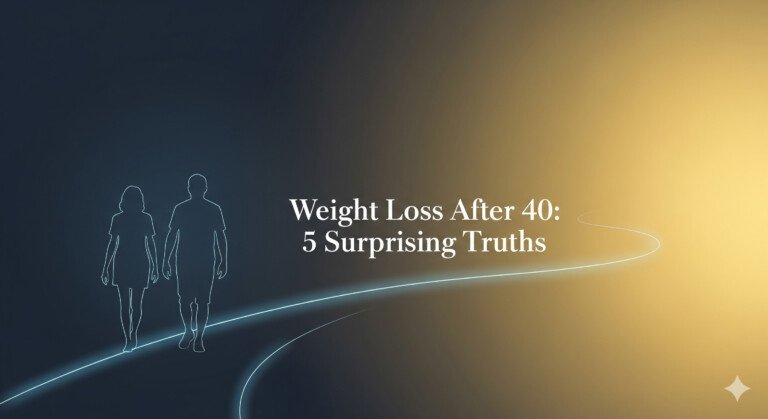The Psychology of Weight Loss: Mind Over Matter
If you’ve ever felt like you were doing everything right—counting every calorie, hitting the gym, and eating “clean”—only to be met with a frustrating plateau or a quick rebound, you’re not alone. The common approach to weight loss focuses almost exclusively on the physical: diet and exercise. But what if the biggest barrier to your success isn’t your body, but your mind? The truth is, the key to sustainable, lasting change lies in understanding the fascinating and powerful psychology of weight loss.
This isn’t about magical thinking; it’s about practical, science-backed strategies that address the mental and emotional components of eating and exercise. Your brain’s intricate wiring, your deeply held beliefs, and your emotional state play a far greater role in your relationship with food than you might think. By learning how to work with your mind, rather than against it, you can overcome common obstacles and transform your habits from the inside out.
The Right Mindset for Weight Loss: It’s Everything
Your journey begins not with a new diet, but with a mental shift. Cultivating the right mindset for weight loss is the single most important factor for long-term success.
- Ditch the “Diet” Mentality: The word “diet” implies a temporary state of deprivation. Instead, view your changes as a permanent lifestyle shift. This helps you move from short-term fixes to long-term sustainability.
- Embrace a Growth Mindset: A fixed mindset believes your abilities are set in stone. A growth mindset believes you can develop and improve. Instead of saying, “I’m bad at this,” tell yourself, “I’m learning and improving every day.” This single shift can transform setbacks into learning opportunities.
- Focus on Non-Scale Victories: The scale can be a terrible motivator. Instead, celebrate non-scale victories like having more energy, your clothes fitting better, improved sleep, or feeling stronger during a workout. These wins reinforce your new habits and keep you motivated even when the scale is slow to move.
- Practice Self-Compassion: Beating yourself up after a misstep only leads to more negative behavior. Treat yourself with the same kindness you would a friend. Forgive yourself for slips and recommit to your goals.

Unraveling the Connection: The Psychology Behind Eating Habits
Your eating patterns are more than just hunger cues; they are deeply ingrained habits often tied to emotions, environment, and social situations. Understanding the psychology behind eating habits is the first step to changing them.
- Emotional Eating: Many people turn to food for comfort, to celebrate, or to cope with stress, boredom, or sadness. Learning to recognize these triggers is crucial. Instead of reaching for a snack, find non-food ways to cope, such as going for a walk, calling a friend, or journaling.
- Environmental Cues: Your environment can have a massive impact on what and how much you eat. Simple changes like keeping unhealthy foods out of sight, using smaller plates, and not eating in front of the TV can make a huge difference.
- Social Influences: Social situations can be tricky. We often mirror the eating habits of those around us. Be mindful of this and focus on your own hunger cues rather than what others are doing.
The Gut-Brain Axis: Your Brain and Weight Loss
The link between your brain and weight loss is literal. The gut-brain axis is a two-way street of communication that connects your central nervous system to your digestive system.
- Hormone Regulation: Your gut produces hormones and neurotransmitters that can influence appetite, cravings, and mood. A healthy, balanced gut microbiome can help regulate these signals, while an imbalanced one can send signals that drive you to overeat, especially high-sugar foods.
- Cravings and Dopamine: Eating highly palatable foods triggers the release of dopamine, a feel-good chemical in your brain. This reward pathway can lead to addictive-like eating behaviors, especially for junk food.
- The “Full” Signal: The speed at which you eat can affect your brain’s ability to receive the “full” signal from your gut. Eating slowly allows your body and mind to register that you’ve had enough, preventing you from overeating.
Supporting the health of this axis can be a great way to help with your goals. Omega-3 fatty acids are a key supplement that supports brain health and may also aid in reducing inflammation, while probiotics can help foster a balanced gut microbiome.

A Mental Reset: How Beliefs Affect Fat Loss
Your deepest beliefs about yourself and your capabilities can either empower you or hold you back. The way beliefs affect fat loss is often overlooked, but it’s one of the most powerful mental tools you have.
- Self-Limiting Beliefs: Do you believe that you’ll always be overweight? That you’re not strong enough to work out? These self-limiting beliefs become a self-fulfilling prophecy. Identify them and challenge them. Replace “I can’t do this” with “I’m going to try this.”
- Visualization: Athletes use visualization to improve their performance, and you can use it for weight loss. Spend a few minutes each day visualizing yourself making healthy choices and achieving your goals. This practice can rewire your brain and make healthy behaviors feel more natural.
- Positive Self-Talk: The voice in your head matters. Replace negative self-talk with positive affirmations. Instead of saying “I’m so lazy,” try “I have the power to make healthy choices today.”
- Identity Shift: Instead of thinking, “I’m a person trying to lose weight,” start thinking, “I am a healthy person who makes good choices.” This powerful identity shift aligns your actions with your new self-image.
Stress and the Scale: Mental Health and Weight
The link between mental health and weight is undeniable. Chronic stress and anxiety can wreak havoc on your body and your weight loss efforts.
- Cortisol and Cravings: When you are stressed, your body releases the hormone cortisol. High cortisol levels can lead to increased cravings for high-calorie, sugary foods and can promote the storage of belly fat.
- Mindless Eating: Stress often leads to mindless eating, where you eat for comfort rather than hunger. Learning to manage stress is therefore a critical component of any weight loss plan.
- Sleep Deprivation: As mentioned earlier, stress often leads to poor sleep. This in turn, creates a hormonal imbalance that fuels a vicious cycle of overeating and fat storage.
- Finding Healthy Outlets: Find non-food ways to manage stress, such as meditation, yoga, or deep breathing exercises. Incorporating supplements that support a healthy stress response, such as ashwagandha or magnesium, may also be helpful in managing cortisol levels and cravings, providing you with a better foundation to make healthy choices.

Winning the Mental Game: Cognitive Tricks for Weight Loss
Once you understand the principles, you can start applying simple cognitive tricks for weight loss to make your journey easier.
- “If-Then” Planning: Plan for your triggers. For example: “If I’m at a party and see the dessert tray, then I will get a glass of sparkling water instead.”
- “The 5-Minute Rule”: When you have a craving, tell yourself you will wait just 5 minutes. Often, the urge will pass. This gives your brain time to catch up and overrides the immediate impulse.
- Habit Stacking: Attach a new healthy habit to an existing one. For example: “After I brush my teeth in the morning, I will drink a full glass of water.”
- The “One Good Thing” Rule: If you have an indulgent meal or a difficult day, make one good choice afterward. For example, have a healthy snack or go for a short walk. This keeps the momentum going and prevents a total spiral.
Conclusion
True, lasting weight loss is a mental game, and your mind is the most powerful tool you have. By understanding the psychology of weight loss, you can move beyond frustrating cycles of dieting and rebound. It’s about shifting your mindset, addressing the triggers behind your habits, and using simple cognitive strategies to take control of your relationship with food. It’s a journey of self-discovery where the person you become is far more important than the number on the scale.

Frequently Asked Questions (FAQ)
1: Can you lose weight with mindset alone
While mindset is a crucial component, it is not a magic bullet. It must be paired with physical changes. However, mindset and healthy habits are the engines that drive sustainable weight loss. Without them, diet and exercise are often temporary and unsustainable.
2: How do I change my relationship with food?
Begin by practicing mindful eating. Pay attention to your hunger and fullness cues. Avoid eating in front of screens. Also, start to identify emotional triggers that lead you to overeat.
3: Is emotional eating normal?
Yes, occasional emotional eating is a normal human behavior. The key is to recognize it and find non-food ways to cope with your emotions, whether it’s talking to a friend, exercising, or journaling.
4: How can I deal with cravings?
Cravings are often temporary. Try the “5-minute rule,” drink a glass of water, or distract yourself with an activity. Also, make sure you are not overly restricting yourself, as this can lead to intense cravings.
5: What’s the biggest mental barrier to weight loss?
The biggest barrier is often a fixed mindset and self-limiting beliefs. The belief that you cannot change or succeed can become a self-fulfilling prophecy. By adopting a growth mindset and focusing on small, consistent wins, you can overcome this.
Disclaimer:
This post may contain affiliate links. If you purchase through them, we may earn a small commission at no extra cost to you. Also, this content is for informational purposes only and does not substitute professional medical advice.










